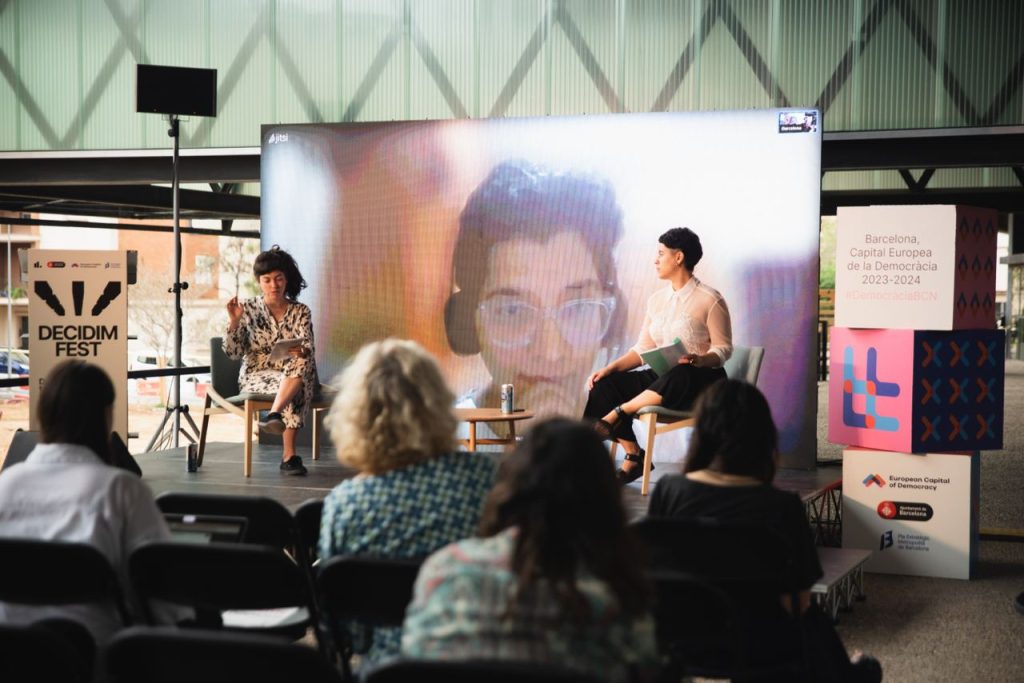Decidim Fest is the annual conference of Meta Decidim, the community who use and develop the pioneering open-source participation platform. Established in the wake of the Indignados anti-austerity movement in Spain, Decidim.Barcelona was launched Feb 1 2016. In the seven years since, Decidim has been adopted by more than 200 local and regional governments, as well as over 100 social organisations.
Walking around the Canódrom between the panels, the mood is one of a reunion, and there is a real sense of excitement at the community getting together. Their first annual conference took place in 2017, and since then, it has been the biggest meeting of developers, political practitioners, and anyone curious to learn more.
At this year’s conference, the big topic is artificial intelligence. How will it change the future of Decidim and other participative platforms? How can it be harnessed without reproducing biases or infringing on the agecy of citizens? And should we even be calling it artificial at all?
Artificial or Collective Intelligence?
“Artificial intelligence is not artificial,” says Xabier E. Barandiaran near the beginning of the first of three panels devoted to AI. Currently a lecturer in philosophy at the University of the Basque Country, he is a founding member of Decidim, and previously held the post of Director of Democratic Innovation in Barcelona’s city council.
Rather than being “artificial”, he points out that AI is a product of humanity’s collective intelligence. He adds that these kinds of extensions to human intelligence are nothing new – humanity has been supplementing its intelligence with tools at least since the invention of the written word.
Like many people I talk to at the festival, Barandiaran sees AI as both a risk and an opportunity. In his talk, he notes that Decidim can benefit from AI in multiple ways – allowing people with no programming background to create their own modules, for example, or assisting in the facilitation of participative processes. He emphasises that alongside the big players in the industry, there is also a vast network of open source AI tools that could serve the participatory democracy community, without the drawbacks of working with big tech solutions.
AI’s challenges: Agency and Bias
One of the big themes across all the panels was to ensure that amid the enthusiasm for new AI tools, human agency doesn’t get lost along the way. Robert Bjornsson of Citizens Foundation mentions in his talk that his team developed a tool which automatically created recommendations based on prompts. “We deleted it,” he tells the audience. It was clear to the team that AI can’t replace human agents with local knowledge and their own specific needs.
Nonetheless, in their My Neighbourhood project in Reykjavik, they have already implemented an AI-based retrieval system – a chat prompt which can answer questions about a set of proposals, making them easier to search and categorise. They have also launched a tool called Policy Synth, designed to combine the insights of AI with collective intelligence. The guiding idea is to experiment with new things, test, and see what works and what doesn’t – all while ensuring that agency remains key.
It’s a point to which Rayén Jara Mitrovich and their fellow panelists Sofía Trejo and Nandini Chami return to in the final talk of Friday. Together, they discuss the advocacy work of feminist organisations from the Global South to highlight the impact of new technologies on their communities. While data has a proven tendency to reproduce biases, they emphasised the need for an experimental, even playful approach to developing tools which can help increase the visibility of these communities.
Biases in the AI community were also addressed by Ashwin Singh, former Diversity, Equity and Inclusion Admin for the group Queer in AI. They talked about their work to ensure that queer voices are also heard within the AI community. Among other things, Queer in AI provides financial support for graduate applications, the cost of which can run to thousands of dollars. The aim is to ensure that queer voices, including those from the global south, get heard in debates surrounding AI, and play a part in developing the technology.
A unique community
After an evening of drinks and catching up, Friday morning’s workshops got off to a slightly late start. In a seminar hosted by Open Source Politics, participants examined features offered by competing tools, before breaking off into four teams to “speed design” new features for Decidim. The results included proposals for vocal contributions in participatory processes, new mapping features, and a tool for segmenting contacts. Watch this space.
Simonas Zilinskas of Open Source Politics co-led the seminar. “It’s a cliché to say it, but what makes Decidim special is the community,” he tells me. “It has an interesting political discourse behind it, it has technical workshops, it welcomes people who’ve never heard of Decidim before. It’s a truly democratic space.”
